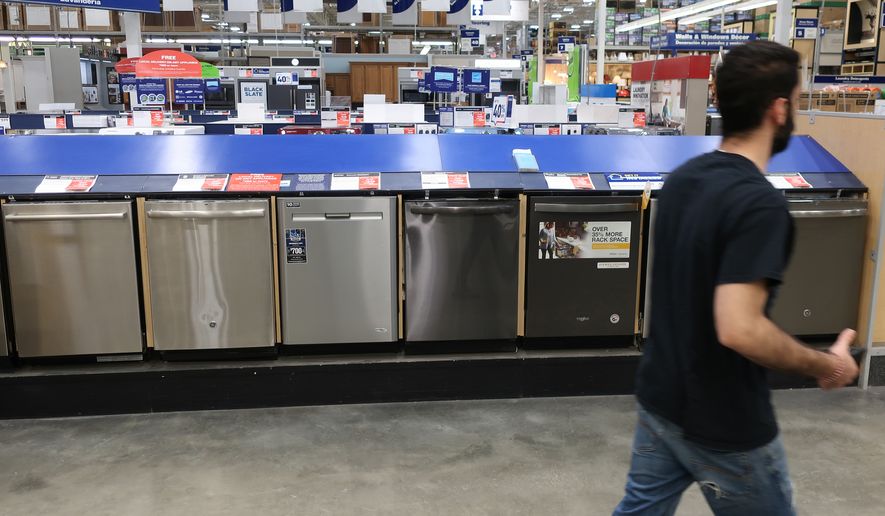Those agitating for faster dishwashers may see their hopes go down the drain with the incoming administration.
Two Biden administration picks — California Attorney General Xavier Becerra and Natural Resources Defense Council President Gina McCarthy — are leading the legal fight to reverse the Trump administration’s recently approved rule creating a new product class for speedier, high-performance residential dishwashers.
The defense council filed a petition Tuesday for review in federal court seeking to set aside the Energy Department’s October rule on quick-wash dishwashers, followed Wednesday by a lawsuit from Mr. Becerra and Democratic attorneys general representing 14 states, the District of Columbia and New York City.
They argue that the department violated federal law, including the Energy Policy Conservation Act, by exempting the newly created class of dishwashers from federal efficiency standards. In addition, such appliances would use more electricity per cycle and thus cost more to run, said the lawsuits.
“As millions of Americans across the country struggle to pay their electricity bills, the Trump administration chooses to dismantle cost-saving energy efficiency standards,” Mr. Becerra said in a statement. “The goal of today’s lawsuit is simple: hold the Department of Energy accountable for its unlawful action and safeguard a program that saves consumers money and decreases pollution to our environment.”
The lawsuits come as an indication that the Biden administration may take an entirely different approach to energy regulations than red-tape-cutting President Trump, especially when it comes to dishwashers.
Mr. Becerra was named by President-elect Joseph R. Biden to head the Health and Human Services Department, while Ms. McCarthy, the Environmental Protection Agency administrator in the Obama administration, was chosen to serve as “climate czar” and lead the White House Office of Domestic Climate Policy.
Pushing back against the legal challenges was Sam Kazman, general counsel of the free-market Competitive Enterprise Institute (CEI), who argued that lawsuits would “soak consumers.”
He said federal energy regulations have resulted in cumbersome dishwashers that take up to two-and-a-half hours per cycle without getting dishes as clean as the pre-regulatory models.
“Dishwashers are one of the worst examples of overregulated appliances,” Mr. Kazman said in a statement. “For years, they’ve gone up in price and down in performance as a result of increasingly stringent ’efficiency’ standards that are worse than non-productive.”
He called the Energy Department’s new high-performance dishwasher rule “a welcome step towards remedying this problem. Whatever goals the 15 state attorneys general might have in bringing this challenge to that rule, serving consumers is definitely not one of them.”
The Energy Department announced Oct. 23 that it would add a third product class of residential dishwashers — there are now classes for standard and compact dishwashers — that feature “cycle times of 60 minutes or less from washing through drying.”
“These changes will allow Americans to choose products that complete a wash or dry cycle more quickly and efficiently and give consumers the choice to decide what dishwasher is most suitable for their personal needs,” the department said.
The 60-minute cycle time was based on testing conducted during the rule-making process indicating that “on average, the new product class can complete the cycle faster while scoring a higher level of cleaning performance, compared to tested normal cycles,” the Energy Department said.
“With this final rule making, we are once again letting the American people — not Washington — decide what appliances to use in their homes,” Energy Secretary Dan Brouillette said in a statement.
The final rule was spurred by a petition filed by CEI that argued that dishwashers had become energy-wasters because many consumers had resorted to running cycles twice or handwashing their dishes beforehand as a result of “slow speeds and poor performance.”
The Natural Resources Defense Council (NRDC) accused the department of creating a “loophole” by “needlessly creating a new category exempt from any energy-saving requirements, potentially leading to higher household utility bills and more pollution.”
“This was a senseless Trump administration action that hurts consumers and all who’ve benefited from the significant efficiency gains in dishwashers over more than 30 years,” said NRDC energy efficiency advocate Joe Vukovich. “It also sets an appalling precedent that the agency could abuse by picking any trivial feature of an appliance and exempting it from all efficiency standards.”
Marc Morano, publisher of the skeptical Climate Depot, blasted the legal challenge, saying that “Americans have had it with the government sucking the life and water out of — their lives.”
“After punishing lockdowns in 2020, Americans’ one glimmer of hope was the Trump administration allowing new dishwashers to actually clean our dishes with a speed reminiscent of the machines from our parents’ generation,” Mr. Morano said in an email. “But now, environmentalists led by NRDC can’t even let us have this one soapy pleasure.”
Both Mr. Becerra and the NRDC have plenty of experience in suing the Trump administration: The environmental group has filed 100 such lawsuits, as has the California attorney general.
The NRDC was joined in the lawsuit by Earthjustice, representing the Sierra Club, the Consumer Federation of America, and the Massachusetts Union of Public Housing Tenants.
In addition to California, the states on the attorneys general’s lawsuit are Connecticut, Illinois, Massachusetts, Maine, Michigan, Minnesota, Nevada, New Jersey, New Mexico, New York, Oregon, Vermont and Washington. The District of Columbia and New York City also joined the filing.
• Valerie Richardson can be reached at vrichardson@washingtontimes.com.




Please read our comment policy before commenting.